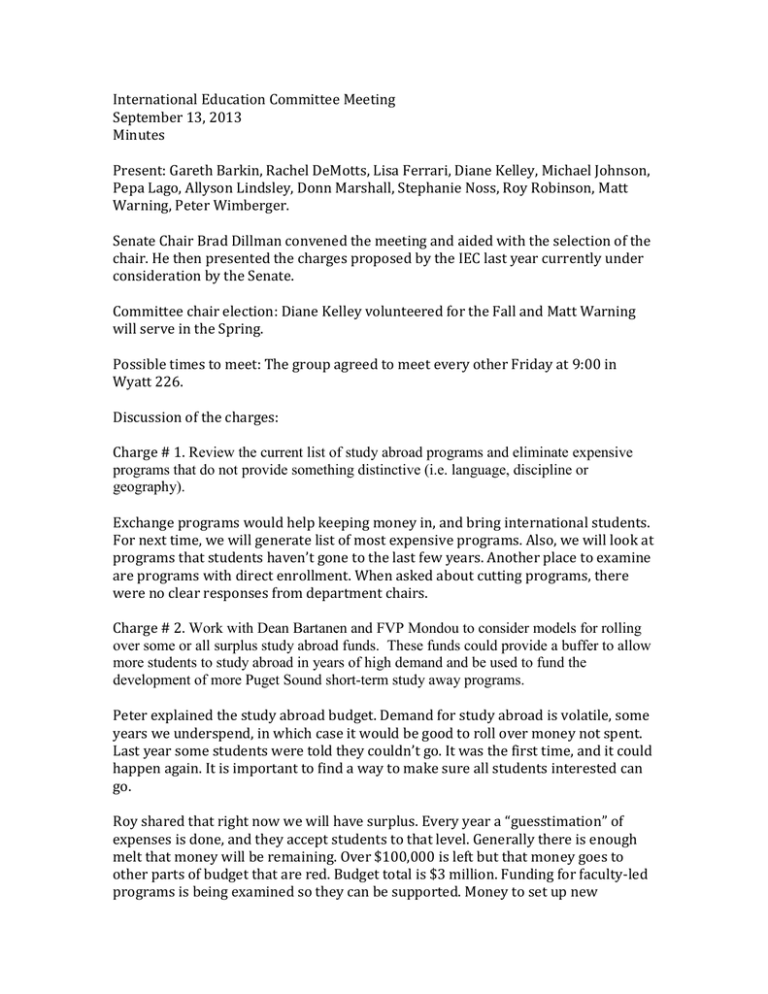
International Education Committee Meeting
September 13, 2013
Minutes
Present: Gareth Barkin, Rachel DeMotts, Lisa Ferrari, Diane Kelley, Michael Johnson,
Pepa Lago, Allyson Lindsley, Donn Marshall, Stephanie Noss, Roy Robinson, Matt
Warning, Peter Wimberger.
Senate Chair Brad Dillman convened the meeting and aided with the selection of the
chair. He then presented the charges proposed by the IEC last year currently under
consideration by the Senate.
Committee chair election: Diane Kelley volunteered for the Fall and Matt Warning
will serve in the Spring.
Possible times to meet: The group agreed to meet every other Friday at 9:00 in
Wyatt 226.
Discussion of the charges:
Charge # 1. Review the current list of study abroad programs and eliminate expensive
programs that do not provide something distinctive (i.e. language, discipline or
geography).
Exchange programs would help keeping money in, and bring international students.
For next time, we will generate list of most expensive programs. Also, we will look at
programs that students haven’t gone to the last few years. Another place to examine
are programs with direct enrollment. When asked about cutting programs, there
were no clear responses from department chairs.
Charge # 2. Work with Dean Bartanen and FVP Mondou to consider models for rolling
over some or all surplus study abroad funds. These funds could provide a buffer to allow
more students to study abroad in years of high demand and be used to fund the
development of more Puget Sound short-term study away programs.
Peter explained the study abroad budget. Demand for study abroad is volatile, some
years we underspend, in which case it would be good to roll over money not spent.
Last year some students were told they couldn’t go. It was the first time, and it could
happen again. It is important to find a way to make sure all students interested can
go.
Roy shared that right now we will have surplus. Every year a “guesstimation” of
expenses is done, and they accept students to that level. Generally there is enough
melt that money will be remaining. Over $100,000 is left but that money goes to
other parts of budget that are red. Budget total is $3 million. Funding for faculty-led
programs is being examined so they can be supported. Money to set up new
programs is needed too. Australian programs are getting expensive. It is important
to look at exchange programs so the money stays here.
Charge # 3. Once the financial model is resolved, revise the short-term study abroad
guide for faculty and develop a clear template for proposing, organizing and leading
short-term study abroad programs.
Charge #4. Work with the Office of Institutional Research to evaluate the questions
addressing study abroad that are currently on sophomore and senior surveys, as well as
the returning questionnaire for study abroad students. The committee should attempt to
identify clear questions for which the response will be useful to the institution.
Charge #5. Continue to work with faculty to encourage the integration of study abroad
experiences into on-campus classes and research symposia, and work with the SLC and
Dean of Students to encourage integration of study abroad experiences into co-curricular
activities.
A sexual assault work group, charged by VP/DoS Mike Segawa, was convened last
year and is wrapping up its final report now. (Donn participated in that group.) It
will be useful to talk to them to know about policies, what students need to know.
This discussion about sexual assault risk on student abroad did not come up in that
work group, but it should have. Doing preventive work prior to going is a priority.
Committee agreed that this is a charge the committee should examine. Especially
with study abroad providers, we need to know about their policies and how they
will affect our studies. As a result of this discussion the committee agreed to add a
sixth charge to the ones already being considered:
Charge # 6. Determine what information study abroad students receive about sexual
assault before they leave to study abroad and also what information they may get about
how to report an incident of sexual assault should it happen.
Some other topics to consider might be to look at the Michel Rocchi International
District for students who have been abroad. Work with that group of students to
showcase they activities and work. Ideas for activities with that group would be
welcome. Some ideas include evenings to attend meals, movies, slide shows,
presentations, etc. Challenge: MRID is located in three different locations within the
building. Access from one to the other is not easy.
Peter posed a question: Students coming back from more experiential programs
have a disaffected attitude when they are back in the classroom. How to engage
them in a better way when they are back in the classroom?
The number of international students is down this year from 10 to 8: from Spain and
Canada. It would be good to increase these numbers. The role of the committee
could be to steer discussion, put pressure, add weight to the conversation. We have
so few that we don’t even make the list of universities with an international student
population. Some reasons: there’s not an effort, not a priority, not a lot of
scholarships. Other institutions have agreements with partner institutions, or have a
population of students not seeking a degree. UPS requires both TOEFL and SAT
while other institutions don’t. We cannot change policies but we can make
recommendations to increase intl. student presence, and create relationships with
the university that eventually will bring more
Another discussion question was about students on probation and their ability to go
abroad. There might be lack of consistency in our policies. The committee agreed to
add this as a seventh charge for the year:
Charge # 7. Examine study abroad application documentation for clarity regarding
application rules for students placed on probation.
Meeting was adjourned at 9:50
Respectfully submitted by Pepa Lago



